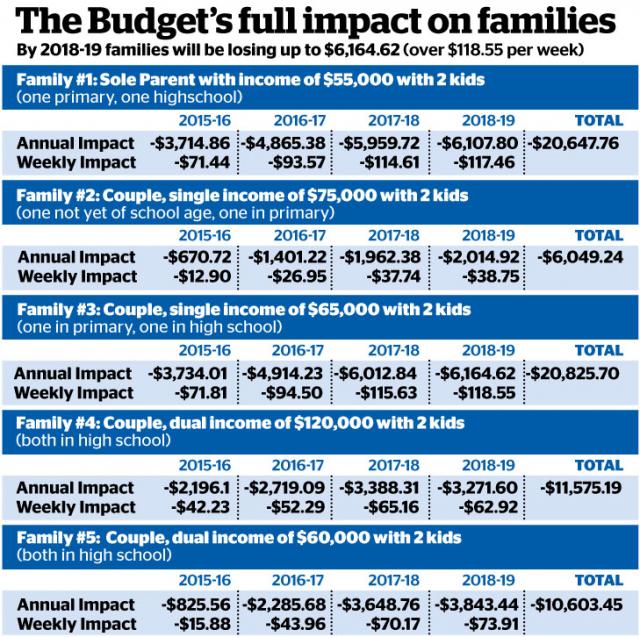Search
Democracy Links
Member's Off-site Blogs
"fair" game .....

Families with children on the lowest incomes will bear the brunt of the federal government's budget cuts, while high income families will actually see their disposable incomes increase slightly over the next four years.
New analysis from the National Centre for Social and Economic Modelling has shown how the government's budget consolidation - for the second year in a row - is being made at the expense of the less well-off.
NATSEM divides the community into five segments, or quintiles, each with a little over 2.5 million families. It has found the government's families package - including its popular childcare payments - will benefit middle- to high-income families more than low-income families.
It has also found the poorest 20 per cent of households with children will lose up to 7.1 per cent of their total disposable income over the next four years, after all budget measures are taken into account.
By contrast, households with children in the top 20 per cent will see their disposable incomes increase slightly, by 0.2 per cent, by the end of 2018/19.
The Abbott government has enjoyed a surge in popularity after its second budget, with voter anger over last year's broken promises dissipating in the face of a seemingly softer and "fairer" budget.
The budget has also solidified Prime Minister Tony Abbott's grip on power within the Coalition, with previously antagonistic colleagues acknowledging the case to replace him has weakened seriously.
But NATSEM's Ben Phillips says the government's second budget - which makes roughly $18 billion of savings over the next four years - has done little to reverse the "unfair" redistribution of its first budget.
"There's a view that perhaps the government's families package has evened up the fairness [from last year], but in terms of the dollars that's probably not really the case," Mr Phillips says.
"There was certainly a bit more generosity in the families package, but the reality is most childcare dollars go to middle-income families and high-income families, they don't go to the lower end. So I guess it's all in the political messaging and that seems to have played out pretty well."
According to NATSEM's modelling, a single-parent family with two children (one in primary school, one in high school) with an income of $55,000 will lose $3715 this financial year, or $71.40 a week, as a consequence of all 2015/16 budget changes.
Those losses will increase every year - losing $4865 in 2016/17, then $5960 in 2017/18, and $6108 in 2018/19 - to total $20,648 by the end of 2018/19.
By contrast, a couple with two children (both in high school) with a dual income of $120,000 will lose just over half that amount, a smaller $11,575 over the next four years.
NATSEM's modelling compares the trajectory of budget measures in this budget to the trajectory of measures in Labor's last budget in 2013.
NATSEM's Mr Phillips says the disposable income of high-income families will improve slightly from this budget because not only will they not lose family payments or pensions and allowances, but they will also gain from the abolition of the carbon price from Labor's last budget, among other things.
Treasurer Joe Hockey has called his budget "responsible, measured and fair," saying it would be a big help for small businesses and families.
"We're trying to get the balance right, saving on the one hand and spending in other areas on families to help them get through," Mr Hockey has said.
Labor Leader Bill Shorten said NATSEM's analysis shows there are significant hidden costs to families in this budget and criticised the government for failing to reveal the extent of the impact on low-income households.
"The closer you look, the worse this budget gets," Mr Shorten said.
"It's proof that Tony Abbott's promise not to hurt families was only ever a desperate lie to save his own job. This Budget has all the same unfairness and pain for families hidden in the fine print."
NATSEM's analysis comes just days after the Australian Council of Social Service's own analysis of the budget showed the government's decision to keep most of last year's budget cuts, and to introduce new ones in the May budget, will strip more than $15 billion from families and lower-income Australians over the next four years.
Shadow Minister for Families Jenny Macklin has written to all Nationals MPs and senators urging them to vote against cuts in last year's budget to Family Tax Benefits, including plans to freeze Family Tax Benefit rates and to cut off families from Family Tax Benefit B when their youngest child turns six.
"This measure alone will leave single income families more than $3000 a year worse off," the letter says.
NATSEM analysis shows federal budget to hit the poor hardest, while rich benefit
- By John Richardson at 25 May 2015 - 10:00am
- John Richardson's blog
- Login or register to post comments
Recent comments
2 hours 13 min ago
2 hours 23 min ago
2 hours 31 min ago
2 hours 57 min ago
3 hours 9 min ago
3 hours 14 min ago
6 hours 44 min ago
7 hours 55 min ago
8 hours 48 sec ago
8 hours 59 min ago